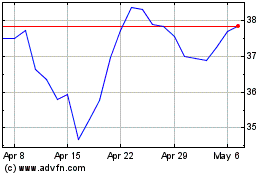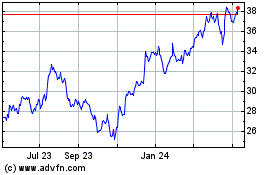Appeals Court Throws Out $1.27 Billion Penalty Against BofA -- Update
May 23 2016 - 12:51PM
Dow Jones News
By Aruna Viswanatha, Christina Rexrode and Devlin Barrett
A federal appeals court on Monday reversed a lower court order
that Bank of America Corp. pay a $1.27 billion penalty in
connection with mortgages sold by its Countrywide unit., a major
blow to the government which had won the high-profile financial
crisis case at trial.
The U.S. Court of Appeals for the Second Circuit said it agreed
with the bank, which argued the government didn't provide
sufficient proof at trial.
The "Hustle" case revolves around a civil lawsuit that the
Manhattan U.S. attorney's office filed against Bank of America in
2012. It alleged that a precrisis Countrywide Financial Corp.
program called Hustle had churned out shoddy mortgages with a focus
on quantity, not quality, and then misrepresented those loans when
selling them to Fannie Mae and Freddie Mac, which had to be propped
up by government money in the financial crisis.
A jury found Bank of America liable for fraud in the case in
2013.
The appeals panel said the government didn't prove the bank had
intended to commit fraud when it signed deals with the housing
entities, which it said was necessary in order to sustain the
case.
The government "presented no evidence" that the executives
involved in the alleged scheme were "involved in the negotiation or
execution of these contracts," the panel said.
Spokesmen for the Justice Department and the U.S. Attorney's
office in Manhattan didn't immediately comment on the ruling, which
also tossed out a $1-million civil penalty against Rebecca Mairone,
a former executive at Countrywide Financial Corp.
While her case was a civil trial, it was a rare instance in
which a senior official at a major bank was held personally
responsible for conduct leading up to the 2008 financial
crisis.
"We're very pleased with the way the circuit ruled," said
Michael Hefter, one of the lawyers representing Ms. Mairone. "It's
a vindication for our trial team and for Ms. Mairone."
In the case the bank had argued that it shouldn't be held
accountable for a program that ended before Bank of America bought
Countrywide. The bank had also argued that the judge who oversaw
the trial had been unfair.
The judges' decision could encourage other companies to push
back against government prosecutions, even though most big
financial institutions have generally preferred to settle such
disputes rather than go through the public scrutiny of a trial. The
case, brought under a 1989 law enacted in the wake of the 1980s
savings and loan crisis, the Financial Institutions Reform,
Recovery, and Enforcement Act (FIRREA), and the favorable verdict
for the government helped pave the way for multi-billion dollar
settlements with top banks for alleged financial crisis misdeeds
under a similar theory.
The Hustle penalty was relatively small compared to other fines
paid by the bank, but it was an important anecdote in the
government's arsenal in its push for bigger penalties against the
banks over related charges. Three weeks after a judge set the
Hustle penalty -- which was higher than Bank of America had
expected -- the bank agreed to a $16.65 billion mortgage-securities
settlement with the Justice Department.
The charges and trial took observers deep inside Countrywide,
which is often seen as a central player in the mortgage meltdown.
According to the government, the firm accepted borrowers'
applications without checking that income levels and other
information was reasonable. It awarded bonuses to employees who
could make the case that a loan deemed defective by corporate
auditors was in fact eligible for sale to Fannie and Freddie, with
little regard for whether customers would be able to repay
them.
Ed O'Donnell, a former Countrywide executive, was the
government's star witness in the trial, testifying that he was
ignored when he alerted his bosses to deterioration in the quality
of the mortgage loans.
He didn't receive any money from the case since it went under
appeal. He did, however, receive nearly $58 million for a separate
lawsuit against Bank of America.
Write to Aruna Viswanatha at Aruna.Viswanatha@wsj.com, Christina
Rexrode at christina.rexrode@wsj.com and Devlin Barrett at
devlin.barrett@wsj.com
(END) Dow Jones Newswires
May 23, 2016 12:36 ET (16:36 GMT)
Copyright (c) 2016 Dow Jones & Company, Inc.
Bank of America (NYSE:BAC)
Historical Stock Chart
From Mar 2024 to Apr 2024

Bank of America (NYSE:BAC)
Historical Stock Chart
From Apr 2023 to Apr 2024
